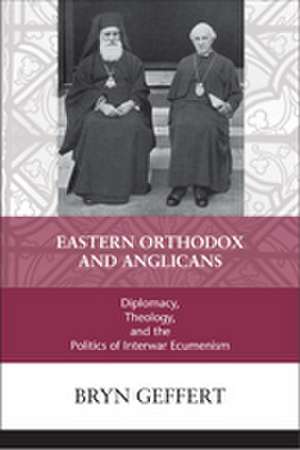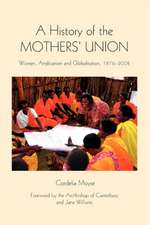Eastern Orthodox and Anglicans – Diplomacy, Theology, and the Politics of Interwar Ecumenism
Autor Bryn Gefferten Limba Engleză Hardback – 14 noi 2009
Eastern Orthodox and Anglicans is the first sustained study of inter-Orthodox relations, the special role of the Anglican Church, and the problems of Orthodox nationalism in the modern age. Despite many challenges, the interwar years were a time of intense creativity in the Russian Orthodox Church. Russian emigres, freed from enforced isolation in the wake of the Russian Revolution, found themselves in close contact with figures from other Orthodox churches and from the Roman Catholic Church and all varieties of Protestant confessions. For many reasons, Russian exiles found themselves drawn to the Anglican Church in particular. The interwar years thus witnessed a concentrated effort to bridge the gap between Orthodox and Anglican. Geffert's book is a detailed history of that effort. It is the story of efforts toward rapprochement by two churches and their ultimate failure to achieve formal unity. The same political, diplomatic, historical, personal, and religious forces that first inspired contact were the ones that ultimately undermined the effort. Bryn Geffert recounts the history of an important chapter in the history of Christian ecumenism, one that is relevant to contemporary efforts to achieve meaningful interfaith dialogue.
"At a time when the sun seems to have set on the twentieth century's long labor to reunite a divided Christendom, historians and theologians do well to remember what the dawn was like. Bryn Geffert provides, for the first time, a full and revealing history of one of the most central and fascinating episodes of modern ecumenism. Historically precise and theologically acute, Geffert's book allows us to appreciate the complex motives that fueled the ecumenical hopes of a distinguished generation, and also to understand why so much intelligence and good will fell so far short of its goal." --Bruce Marshall, Southern Methodist University
"Bryn Geffert brings a tremendous amount and considerable variety of source material to bear on the story of Anglican-Orthodox relations from the nineteenth century to around 1945. He also skillfully presents the secular political and diplomatic context in which Anglican-Orthodox church relations unfolded. This work will generate interest beyond the circle of church historians and ecumenists. Political and diplomatic historians interested in the religious dimensions of European/Middle Eastern/Russian history will find Geffert's work very useful." --Paul Valliere, Butler University
"[Geffert's] is the only work of its kind. Even among related studies, this one is singular in the depth of its coverage of Anglican-Orthodox and other ecumenical connections in the years between the world wars, while tracing the earlier nineteenth-century developments that led up to the intense period of ecumenical engagement, roughly from 1920 to 1937. . . . The narration is superb; the author knows how to tell a most complex story with clarity and color." --Michael Plekon, Baruch College
"At a time when the sun seems to have set on the twentieth century's long labor to reunite a divided Christendom, historians and theologians do well to remember what the dawn was like. Bryn Geffert provides, for the first time, a full and revealing history of one of the most central and fascinating episodes of modern ecumenism. Historically precise and theologically acute, Geffert's book allows us to appreciate the complex motives that fueled the ecumenical hopes of a distinguished generation, and also to understand why so much intelligence and good will fell so far short of its goal." --Bruce Marshall, Southern Methodist University
"Bryn Geffert brings a tremendous amount and considerable variety of source material to bear on the story of Anglican-Orthodox relations from the nineteenth century to around 1945. He also skillfully presents the secular political and diplomatic context in which Anglican-Orthodox church relations unfolded. This work will generate interest beyond the circle of church historians and ecumenists. Political and diplomatic historians interested in the religious dimensions of European/Middle Eastern/Russian history will find Geffert's work very useful." --Paul Valliere, Butler University
"[Geffert's] is the only work of its kind. Even among related studies, this one is singular in the depth of its coverage of Anglican-Orthodox and other ecumenical connections in the years between the world wars, while tracing the earlier nineteenth-century developments that led up to the intense period of ecumenical engagement, roughly from 1920 to 1937. . . . The narration is superb; the author knows how to tell a most complex story with clarity and color." --Michael Plekon, Baruch College
Preț: 446.05 lei
Nou
Puncte Express: 669
Preț estimativ în valută:
85.36€ • 88.19$ • 71.00£
85.36€ • 88.19$ • 71.00£
Carte tipărită la comandă
Livrare economică 20 martie-03 aprilie
Preluare comenzi: 021 569.72.76
Specificații
ISBN-13: 9780268029753
ISBN-10: 026802975X
Pagini: 536
Ilustrații: 20 halftones
Dimensiuni: 159 x 236 x 36 mm
Greutate: 1 kg
Ediția:1st Edition
Editura: MR – University of Notre Dame Press
ISBN-10: 026802975X
Pagini: 536
Ilustrații: 20 halftones
Dimensiuni: 159 x 236 x 36 mm
Greutate: 1 kg
Ediția:1st Edition
Editura: MR – University of Notre Dame Press
Recenzii
"This interesting and important new book offers the first dedicated scholarly investigation into major movements of ecumenical contact among Anglicans and Orthodox between the First World War and the Second World War. Bryn Geffert draws on substantial archival work in English and Russian to write what he calls 'the story of efforts toward rapprochement by two churches and their ultimate failure to achieve formal unity of intercommunion.' . . . Above all, this is a cautionary tale about the difficulties inherent in connections among churches with very positive intentions but no ability to speak with one voice." --The Living Church
"Geffert examines political entanglement and territorial aims as well as complex theological issues with clarity and precision. The conclusion contains insightful reflections on the ecumenical longue dure and relations among the principle Christian traditions during the Cold War and beyond." --The Russian Review
Notă biografică
Bryn Geffert is USMA Librarian and associate professor of history at the United States Military Academy in West Point, New York.










